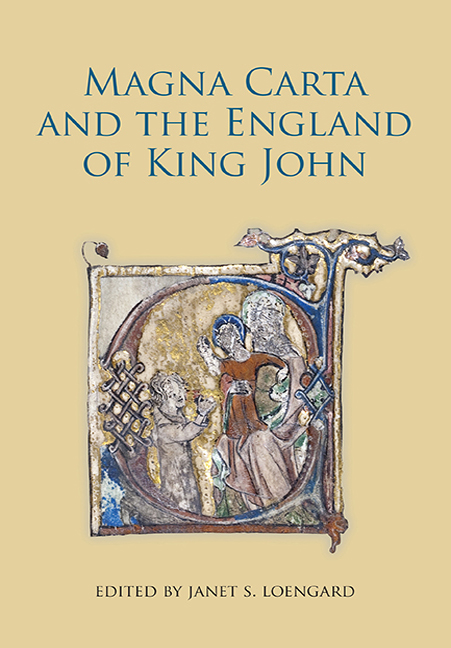Book contents
- Frontmatter
- Contents
- List of Contributors
- List of Abbreviations
- Introduction
- England in 1215: An Authoritarian Angevin Dynasty Facing Multiple Threats
- The Anonymous of Béthune, King John and Magna Carta
- Baronial Paranoia in King John's Reign
- The Forest Eyre in the Reign of King John
- The Managerial Revolution in the English Church
- Magna Carta, the ius commune, and English Common Law
- Justice without Judgment: Criminal Prosecution before Magna Carta
- What Did Magna Carta Mean to Widows?
- The English Economy in the Age of Magna Carta
- The Complaint of King John against William de Briouze (c. September 1210)
- Index
The English Economy in the Age of Magna Carta
Published online by Cambridge University Press: 28 April 2017
- Frontmatter
- Contents
- List of Contributors
- List of Abbreviations
- Introduction
- England in 1215: An Authoritarian Angevin Dynasty Facing Multiple Threats
- The Anonymous of Béthune, King John and Magna Carta
- Baronial Paranoia in King John's Reign
- The Forest Eyre in the Reign of King John
- The Managerial Revolution in the English Church
- Magna Carta, the ius commune, and English Common Law
- Justice without Judgment: Criminal Prosecution before Magna Carta
- What Did Magna Carta Mean to Widows?
- The English Economy in the Age of Magna Carta
- The Complaint of King John against William de Briouze (c. September 1210)
- Index
Summary
Interpretations of the English economy in the era of Magna Carta are currently in a state of flux. For a quarter-century, from the mid-1970s to the late 1990s, the field was dominated by the views of Paul Harvey, particularly those articulated in his 1973 article in Past and Present, entitled ‘The English Inflation of 1180–1220’. Harvey saw escalating wages and prices as inducing a major economic restructuring, one that tended to benefit lords more than other social groups, including the king. Barons successfully met the challenges of inflation by restructuring their landed estates to emphasize direct production of commodities. The Angevin kings, on the other hand, found themselves losing ground to inflation, without a corresponding ability to restructure their estates. They responded by exercising their regalian rights more aggressively, in an effort to compensate for diminishing incomes from land. This policy was bound to have major political consequences. To quote Harvey: ‘No landmark in English constitutional history was more clearly brought about by economic change than Magna Carta.’
Over the course of the past decade, however, Harvey's exposition has come in for sustained criticism. Recent work by Paul Latimer and J. L. Bolton, for example, directly confronts several of Harvey's core arguments about inflation and its influence in the early thirteenth century. In a pair of articles published in 1999 and 2001, Latimer argued that the inflation Harvey attributed to a forty-year period was actually compressed into the space of about five years, between 1199 and 1204. In Latimer's view, the short and abrupt nature of the inflationary surge negates the kind of sweeping economic restructuring advocated by Harvey. Bolton has been an even harsher critic. Using Latimer's work on inflation as his point of departure, he constructed a completely different model for the period. In Bolton's view, King John's reign was defined by deflation rather than inflation, deflation caused by the king's excessive taxation and monetary hoarding. He characterized the era in rather gloomy terms. John's reign, Bolton wrote, encompassed ‘difficult years for the English economy’ in which most levels of society experienced ‘some degree of hardship’. Though perhaps not quite a new orthodoxy, the arguments of Latimer and Bolton have clearly gained currency. Richard Britnell, for example, touched on the matter in his 2004 survey of the medieval economy.
- Type
- Chapter
- Information
- Magna Carta and the England of King John , pp. 151 - 167Publisher: Boydell & BrewerPrint publication year: 2010



